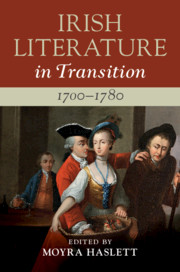Book contents
- Irish Literature in Transition, 1700–1780
- Irish Literature in Transition
- Irish Literature in Transition, 1700–1780
- Copyright page
- Contents
- Illustrations
- Contributors
- Series Preface
- General Acknowledgements
- Introduction
- Part I Starting Points
- Chapter 1 Starting Points and Moving Targets: Transition and the Early Modern
- Chapter 2 ‘We Irish’: Writing and National Identity from Berkeley to Burke
- Chapter 3 Re-Viewing Swift
- Part II Philosophical and Political Frameworks
- Part III Local, National, and Transnational Contexts
- Part IV Gender and Sexuality
- Part V Transcultural Contexts
- Part VI Retrospective Readings
- Index
Chapter 1 - Starting Points and Moving Targets: Transition and the Early Modern
from Part I - Starting Points
Published online by Cambridge University Press: 28 February 2020
- Irish Literature in Transition, 1700–1780
- Irish Literature in Transition
- Irish Literature in Transition, 1700–1780
- Copyright page
- Contents
- Illustrations
- Contributors
- Series Preface
- General Acknowledgements
- Introduction
- Part I Starting Points
- Chapter 1 Starting Points and Moving Targets: Transition and the Early Modern
- Chapter 2 ‘We Irish’: Writing and National Identity from Berkeley to Burke
- Chapter 3 Re-Viewing Swift
- Part II Philosophical and Political Frameworks
- Part III Local, National, and Transnational Contexts
- Part IV Gender and Sexuality
- Part V Transcultural Contexts
- Part VI Retrospective Readings
- Index
Summary
Where do we start when thinking about literature in transition? This chapter uses the volume’s start date, 1700, as the basis for interrogating both the ideas of ‘literature in transition’ and ‘early modern’. Taking Edmund Spenser’s ruminations on change and permanence in the ‘Mutabilitie Cantos’ as its own point of departure, the chapter shows how the paradigm of transition is illuminated by writing in Irish, Latin, and English produced in the century or so preceding 1700. If political turmoil, linguistic contestation, and ethnic strife are the drivers of narrative and self-articulation, of literary resilience, innovation, consolidation, and decline, then the crucible of early modern Ireland has an arresting claim to the concept of transition. Writing in a period of irreversible change generates genealogical firsts – precursors of what is to follow – but also genres specific to their own time. The chapter probes the relationship of literature with transition: as representing change, as its written record, as the document of response to a new world taking shape, or of self-assertion in that world. Finally, it considers questions of perspective, arguing that scholarship is immersed in its own moment and that this directs us to the determining role of the end point in identifying beginnings.
- Type
- Chapter
- Information
- Irish Literature in Transition, 1700–1780 , pp. 31 - 48Publisher: Cambridge University PressPrint publication year: 2020

